初中英语专题讲义之连词
- 格式:docx
- 大小:17.87 KB
- 文档页数:6
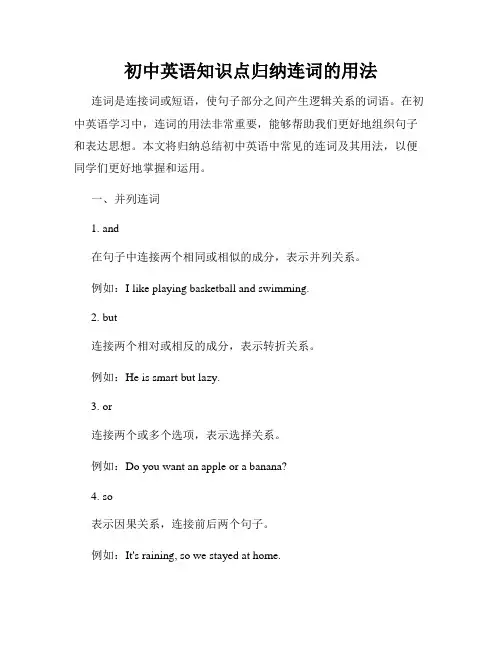
初中英语知识点归纳连词的用法连词是连接词或短语,使句子部分之间产生逻辑关系的词语。
在初中英语学习中,连词的用法非常重要,能够帮助我们更好地组织句子和表达思想。
本文将归纳总结初中英语中常见的连词及其用法,以便同学们更好地掌握和运用。
一、并列连词1. and在句子中连接两个相同或相似的成分,表示并列关系。
例如:I like playing basketball and swimming.2. but连接两个相对或相反的成分,表示转折关系。
例如:He is smart but lazy.3. or连接两个或多个选项,表示选择关系。
例如:Do you want an apple or a banana?4. so表示因果关系,连接前后两个句子。
例如:It's raining, so we stayed at home.二、递进连词1. moreover表示递进关系,引出更多的信息。
例如:He is good at English. Moreover, he is also good at math.2. in addition和 moreover 类似,表示增加信息的递进关系。
例如:She is good at singing. In addition, she can also dance well.三、选择连词1. whether引导一个宾语从句,对两种可能性进行选择。
例如:I haven't decided whether I will go to the party.2. either...or...连接两个相互排斥的选择,表示二者必选其一。
例如:You can either drink tea or coffee.四、让步连词1. although引导让步状语从句,表示相反或意外情况。
例如:Although it's raining, we still went out to play.2. despite和 although 类似,表示尽管有某种情况,但是仍然进行某个行为。
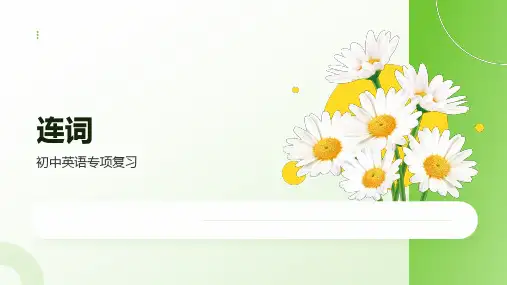
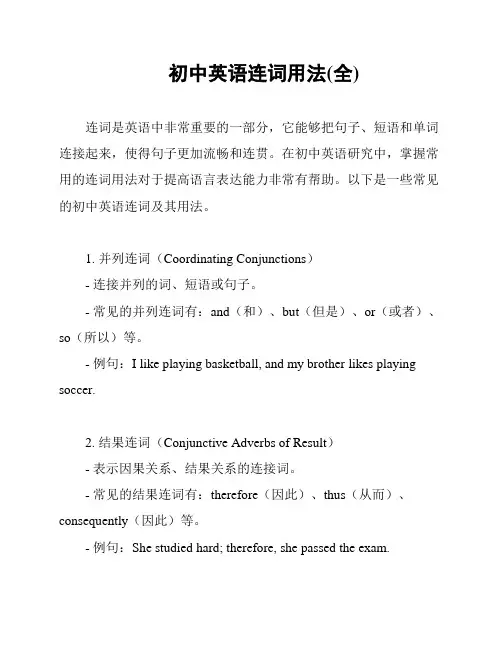
初中英语连词用法(全)连词是英语中非常重要的一部分,它能够把句子、短语和单词连接起来,使得句子更加流畅和连贯。
在初中英语研究中,掌握常用的连词用法对于提高语言表达能力非常有帮助。
以下是一些常见的初中英语连词及其用法。
1. 并列连词(Coordinating Conjunctions)- 连接并列的词、短语或句子。
- 常见的并列连词有:and(和)、but(但是)、or(或者)、so(所以)等。
- 例句:I like playing basketball, and my brother likes playing soccer.2. 结果连词(Conjunctive Adverbs of Result)- 表示因果关系、结果关系的连接词。
- 常见的结果连词有:therefore(因此)、thus(从而)、consequently(因此)等。
- 例句:She studied hard; therefore, she passed the exam.3. 转折连词(Conjunctive Adverbs of Contrast)- 表示转折、对比关系的连接词。
- 常见的转折连词有:however(然而)、but(但是)、nevertheless(然而)、although(尽管)等。
- 例句:She is smart, but she is not very confident.4. 时间连词(Conjunctive Adverbs of Time)- 表示时间关系的连接词。
- 常见的时间连词有:before(在之前)、after(在之后)、while(当……的时候)、since(自从)等。
- 例句:He finished his homework before dinner.5. 原因连词(Conjunctive Adverbs of Cause)- 表示原因关系的连接词。
- 常见的原因连词有:because(因为)、since(因为)、as (因为)、for(因为)等。
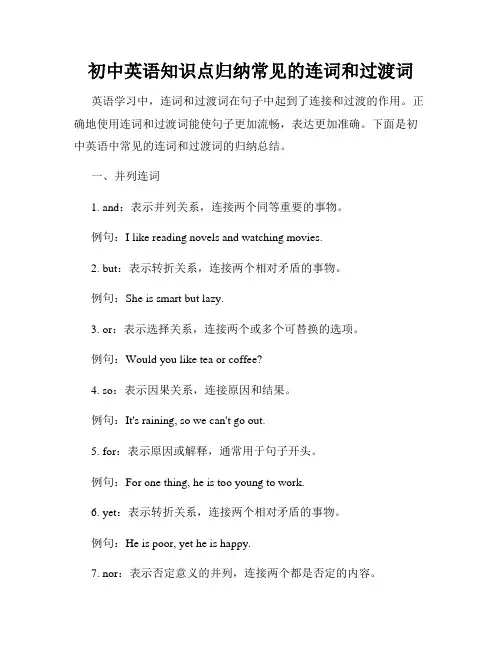
初中英语知识点归纳常见的连词和过渡词英语学习中,连词和过渡词在句子中起到了连接和过渡的作用。
正确地使用连词和过渡词能使句子更加流畅,表达更加准确。
下面是初中英语中常见的连词和过渡词的归纳总结。
一、并列连词1. and:表示并列关系,连接两个同等重要的事物。
例句:I like reading novels and watching movies.2. but:表示转折关系,连接两个相对矛盾的事物。
例句:She is smart but lazy.3. or:表示选择关系,连接两个或多个可替换的选项。
例句:Would you like tea or coffee?4. so:表示因果关系,连接原因和结果。
例句:It's raining, so we can't go out.5. for:表示原因或解释,通常用于句子开头。
例句:For one thing, he is too young to work.6. yet:表示转折关系,连接两个相对矛盾的事物。
例句:He is poor, yet he is happy.7. nor:表示否定意义的并列,连接两个都是否定的内容。
例句:He neither smokes nor drinks.二、递进连词1. moreover:表示进一步的陈述,增加相关信息。
例句:Moreover, the book is easy to read.2. furthermore:表示进一步的陈述,增加相关信息。
例句:Furthermore, the weather is great for a picnic.3. in addition:表示进一步的陈述,增加相关信息。
例句:In addition, I need to buy some groceries.4. besides:表示除此之外,引入额外的事物。
例句:Besides, I have to finish my homework.三、转折连词1. however:表示对前面内容的转折或让步。
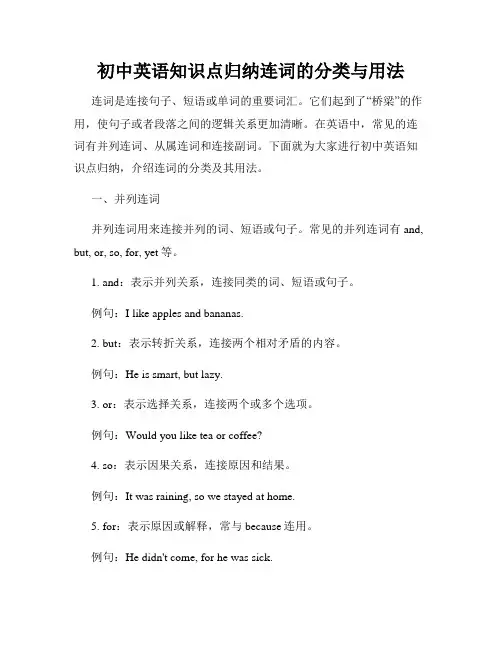
初中英语知识点归纳连词的分类与用法连词是连接句子、短语或单词的重要词汇。
它们起到了“桥梁”的作用,使句子或者段落之间的逻辑关系更加清晰。
在英语中,常见的连词有并列连词、从属连词和连接副词。
下面就为大家进行初中英语知识点归纳,介绍连词的分类及其用法。
一、并列连词并列连词用来连接并列的词、短语或句子。
常见的并列连词有and, but, or, so, for, yet等。
1. and:表示并列关系,连接同类的词、短语或句子。
例句:I like apples and bananas.2. but:表示转折关系,连接两个相对矛盾的内容。
例句:He is smart, but lazy.3. or:表示选择关系,连接两个或多个选项。
例句:Would you like tea or coffee?4. so:表示因果关系,连接原因和结果。
例句:It was raining, so we stayed at home.5. for:表示原因或解释,常与because连用。
例句:He didn't come, for he was sick.二、从属连词从属连词用于连接主要从句和从属从句。
常见的从属连词有that, if, whether, because等。
1. that:引导宾语从句或表语从句。
例句:She said that she was tired.2. if:引导条件从句。
例句:If it rains, we will stay at home.3. whether:引导宾语从句,与if意义相似。
例句:I don't know whether he will come or not.4. because:引导原因或解释从句。
例句:I couldn't go out because it was raining.三、连接副词连接副词用于连接句子或从句,并指明时间、地点、原因、结果等关系。
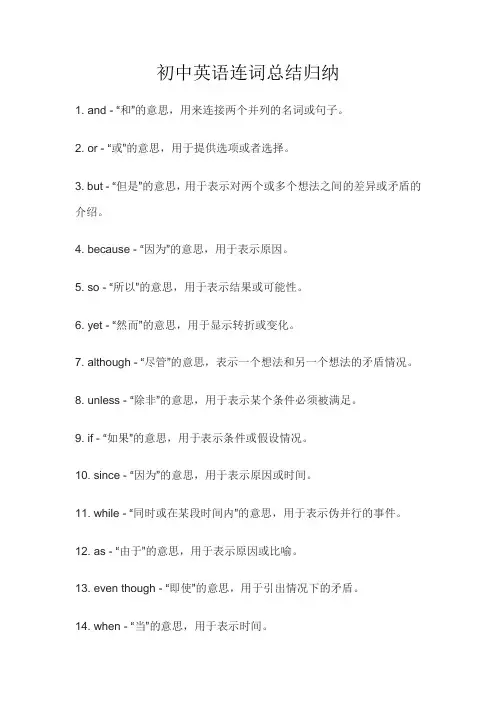
初中英语连词总结归纳1. and - “和”的意思,用来连接两个并列的名词或句子。
2. or - “或”的意思,用于提供选项或者选择。
3. but - “但是”的意思,用于表示对两个或多个想法之间的差异或矛盾的介绍。
4. because - “因为”的意思,用于表示原因。
5. so - “所以”的意思,用于表示结果或可能性。
6. yet - “然而”的意思,用于显示转折或变化。
7. although - “尽管”的意思,表示一个想法和另一个想法的矛盾情况。
8. unless - “除非”的意思,用于表示某个条件必须被满足。
9. if - “如果”的意思,用于表示条件或假设情况。
10. since - “因为”的意思,用于表示原因或时间。
11. while - “同时或在某段时间内”的意思,用于表示伪并行的事件。
12. as - “由于”的意思,用于表示原因或比喻。
13. even though - “即使”的意思,用于引出情况下的矛盾。
14. when - “当”的意思,用于表示时间。
15. where - “在哪里”的意思,用于表示位置。
16. before - “在之前”的意思,用于表示时间的顺序。
17. after - “在之后”的意思,用于表示时间的顺序。
18. until - “直到”的意思,用于表示某个事件的结束。
19. unless - “除非”的意思,用于表示某种条件的必须满足。
20. in case - “万一”的意思,用于为可能发生的情况做准备。
21. as if - “好像的式样”,用于比喻或类比。
22. as long as - “只要”的意思,用于条件或假设情况。
23. so that - “以便”的意思,用于表示目的性。
24. that - “那”的意思,用于引出一个特殊的类型的从句。
25. as soon as - “一…就”的意思,用于表示时间的开始。
26. no matter - “不管”的意思,用于上传任意特定的数据。
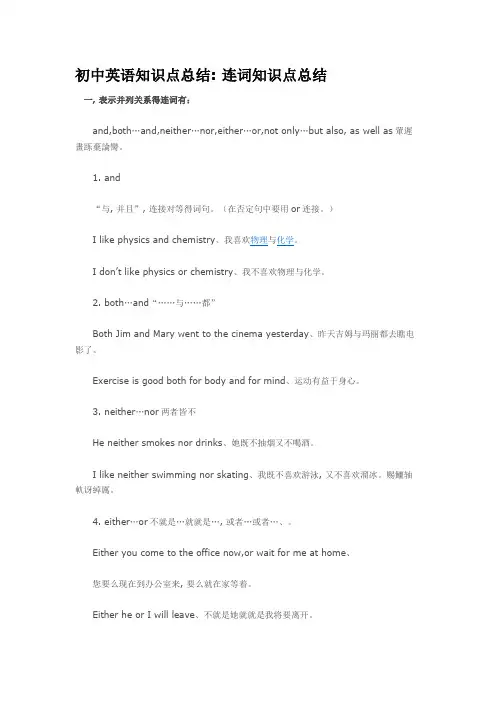
初中英语知识点总结: 连词知识点总结一, 表示并列关系得连词有:and,both…and,neither…nor,either…or,not only…but also, as well as葷遲畫跞棄論臠。
1. and“与, 并且”, 连接对等得词句。
(在否定句中要用or连接。
)I like physics and chemistry、我喜欢物理与化学。
I don’t like physics or chemistry、我不喜欢物理与化学。
2. both…and“……与……都”Both Jim and Mary went to the cinema yesterday、昨天吉姆与玛丽都去瞧电影了。
Exercise is good both for body and for mind、运动有益于身心。
3. neither…nor两者皆不He neither smokes nor drinks、她既不抽烟又不喝酒。
I like neither swimming nor skating、我既不喜欢游泳, 又不喜欢溜冰。
赐鱷轴軌讶綽厲。
4. either…or不就是…就就是…, 或者…或者…、。
Either you come to the office now,or wait for me at home、您要么现在到办公室来, 要么就在家等着。
Either he or I will leave、不就是她就就是我将要离开。
5. not only…but(also)不但……而且……(not only…but also中得also可以省略。
)涼玀弥鱭兌櫟愛。
Not only she but also I am wrong、不但她错了, 我也错了。
He not only made a promise,but kept it、她不仅许诺, 而且做到了。
渾臘蟈魯鰭钨闰。
6. as well as也、又We will rescue Henry as well as you、除了您, 我们还要营救亨利。
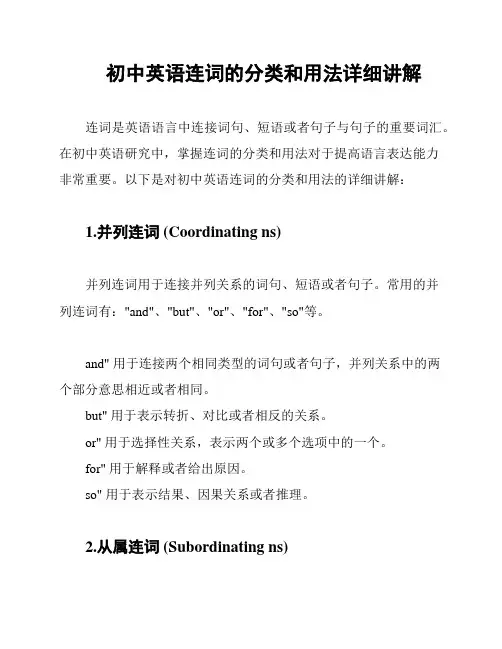
初中英语连词的分类和用法详细讲解连词是英语语言中连接词句、短语或者句子与句子的重要词汇。
在初中英语研究中,掌握连词的分类和用法对于提高语言表达能力非常重要。
以下是对初中英语连词的分类和用法的详细讲解:1.并列连词 (Coordinating ns)并列连词用于连接并列关系的词句、短语或者句子。
常用的并列连词有:"and"、"but"、"or"、"for"、"so"等。
and" 用于连接两个相同类型的词句或者句子,并列关系中的两个部分意思相近或者相同。
but" 用于表示转折、对比或者相反的关系。
or" 用于选择性关系,表示两个或多个选项中的一个。
for" 用于解释或者给出原因。
so" 用于表示结果、因果关系或者推理。
2.从属连词 (Subordinating ns)从属连词用于连接主从关系的词句、短语或者句子。
常用的从属连词有:"because"、"although"、"unless"、"while"等。
because" 用于表示原因。
although" 用于表示让步关系。
unless" 用于表示条件关系,相当于"if。
not"。
while" 用于表示时间关系。
3.连接副词 (Conjunctive Adverbs)连接副词用于连接词句、短语或者句子,承上启下,起到过渡和衔接的作用。
常用的连接副词有:"however"、"therefore"、"meanwhile"、"furthermore"等。
however" 用于表示转折、对比或者相反的关系。
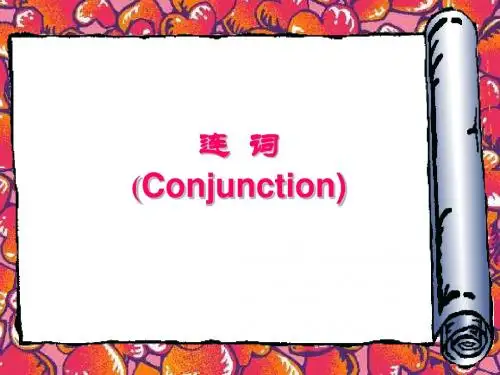
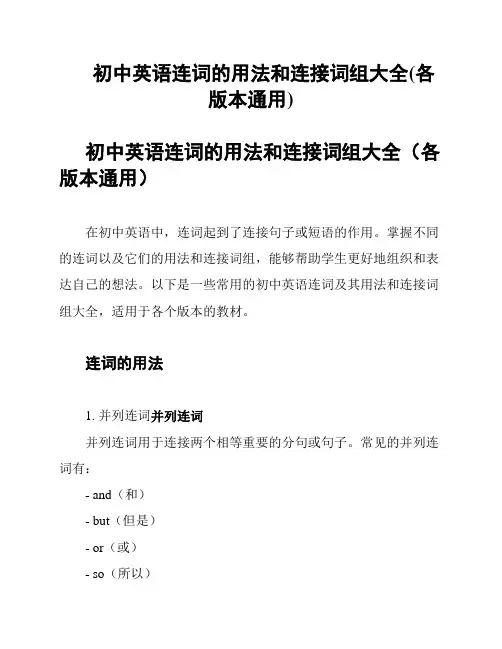
初中英语连词的用法和连接词组大全(各版本通用)初中英语连词的用法和连接词组大全(各版本通用)在初中英语中,连词起到了连接句子或短语的作用。
掌握不同的连词以及它们的用法和连接词组,能够帮助学生更好地组织和表达自己的想法。
以下是一些常用的初中英语连词及其用法和连接词组大全,适用于各个版本的教材。
连词的用法1. 并列连词并列连词并列连词用于连接两个相等重要的分句或句子。
常见的并列连词有:- and(和)- but(但是)- or(或)- so(所以)- for(因为)- yet(然而)- nor(也不)2. 从属连词从属连词从属连词用于引导一个从属分句。
常见的从属连词有:- if(如果)- because(因为)- when(当)- although(虽然)- while(同时)- unless(除非)- since(自从)3. 比较连词比较连词比较连词用于比较两个事物之间的关系。
常见的比较连词有:- than(比)- as(像)- like(像)4. 时间连词时间连词时间连词用于表示时间关系。
常见的时间连词有:- before(在...之前)- after(在...之后)- while(当...的时候)- when(当...时候)5. 因果连词因果连词因果连词用于表示原因和结果之间的关系。
常见的因果连词有:- because(因为)- so(所以)- therefore(因此)- as a result(因此)连接词组大全1. 地点地点- in the park(在公园里)- at home(在家)- on the bus(在公交车上)- near the river(在河附近)- by the sea(在海边)2. 时间时间- at 7 o'clock(在七点)- on Monday(在星期一)- in the morning(在早上)- during the summer(在夏天)- before class(在上课之前)3. 原因原因- because of the rain(因为下雨)- due to the traffic(因为交通堵塞)- owing to the bad weather(因为天气恶劣)- thanks to your help(由于你的帮助)4. 结果结果- as a result(结果)- therefore(因此)- so(所以)- thus(因而)- consequently(因此)以上是初中英语连词的用法和连接词组大全,希望对你有所帮助!。

初中英语知识点总结连词知识点总结连词是连接句子、短语或单词的词语,常用于复合句或并列结构中。
以下是初中英语中常见的连词知识点总结:1. 并列连词(coordinating conjunctions)用于连接并列的句子、短语或单词,常见的有:- and(和)- but(但是)- or(或者)- so(所以)- for(因为)- yet(然而)2. 从属连词(subordinating conjunctions)用于引导从句,常见的有:- because(因为)- if(如果)- when(当...时候)- while(当...的时候)- although(尽管)- since(自从)- unless(除非)- until(直到)3. 连接副词(conjunctive adverbs)有连接作用,常见的有:- however(然而)- therefore(因此)- moreover(而且)- furthermore(此外)- nevertheless(然而)- otherwise(否则)- meanwhile(同时)- instead(代替)4.并列连词和连接副词的用法类似,但连接副词通常需要在句子中加逗号。
5. 连接代词(relative pronouns)用于引导定语从句,常见的有:- who(指人)- whom(宾格,指人)- whose(所有格,指人或物)- which(指物)- that(指人或物)6.介词和从属连词结合的连词- as(像...一样)- as if(好像)- as though(好像)7.连词的选择要根据句意和句子结构来确定,要注意连接词与前后句子的逻辑关系。
总之,掌握常见的连词及其用法可以帮助我们构建正确的句子和理解复杂句子的逻辑关系。
初中英语知识归纳连词的分类及其连接关系连词是连接句子、短语或词语的词类,起到桥梁作用,使得文章或对话之间有着逻辑关系。
在初中英语学习中,连词是必须掌握的语法知识之一。
本文将对连词进行归纳分类,并介绍其连接关系。
一、并列连词1. and:表示并列关系,连接两个相同类型的成分。
例如:I like to read books and watch movies.2. but:表示转折关系,连接两个意义相对的成分。
例如:She is tired but happy.二、选择连词1. or:表示选择关系,连接两个相对的成分。
例如:You can have tea or coffee.2. either...or:表示两者中的任选一,连接两个相对的成分。
例如:You can either eat it or throw it away.三、递进连词1. besides:表示除此之外,还有另外的原因。
例如:Besides, he is also good at playing basketball.2. furthermore:表示此外,另外,用于列举更多的原因或增加论点。
例如:Furthermore, the weather is perfect for a picnic.四、原因连词1. because:表示原因或解释。
例如:She didn't go to school because she was sick.2. since:表示因为,由于。
例如:Since it is raining, we should stay inside.五、结果连词1. so:表示结果,引导对前面所述内容的结论。
例如:He studied hard, so he got good grades.2. therefore:表示结果或推理,引导导致某种结果的原因。
例如:He didn't study for the test, therefore he failed.六、让步连词1. although:表示尽管,表达一种让步关系。
2022~2023学年人教版初中英语语法专题学习/复习讲义语法词性之连词高频考点总结(含从句知识点)(九年级版/中考全国通用)首先,我们需要掌握连词的哪些知识呢?1. 连词的定义✔2. 连词的分类及用法✔3. 连词的注意事项✔一.连词的定义连词,顾名思义,就是把语句连接起来,增加语句逻辑性的词。
连词是虚词,只起到连接词与词、短语与短语、句子与句子的作用,所以连词不能独立担任句子的成分。
说到连词,你可能立马会想到:and, but, or, so这几个连词~不错,这些都是我们耳熟能详的连词。
这类连词,你可以理解为:是把处于平等的、并列的语法地位的词、短语或句子连接起来,所以这类连词叫做“并列连词”。
英文中还有一类连词,专门连接主句和从句的连词,叫作“从属连词”。
主句 + 从属连词 + 从句因为从句可以理解为:是主句的某个句子成分,是主句的一部分,所以这一大类连词叫作从属连词。
考虑到,中文中没有英文中那样的从句,所以我们需要单独理解一下这类连词。
二.连词的分类那我们先来看下并列连词。
1. 并列连词并列连词,起并列、连接作用的,并且它连接着的是有着同等语法地位的单词、词组或者句子。
但是需要注意:“同等地位”,在逻辑上又可以细分下去。
1.1 表并列关系•并列连词中表“并列关系”的:My daughter is smart and cute.我女儿聪明又可爱。
She can dance and play the piano.她既会跳舞又会弹钢琴。
Both my daughter and my son like reading books.我女儿和儿子都喜欢读书。
My daughter not only smart but also cute.我女儿不仅聪明而且敲可爱。
1.2 表否定关系•并列连词可以表“否定关系”。
Neither my daughter nor my son likes apples.我女儿和儿子都不喜欢苹果 。
初中英语知识点总结:连词知识点总结在初中英语的学习中,连词是一个重要的语法知识点。
它像桥梁一样,将句子的各个部分连接起来,使语言表达更加清晰、流畅。
下面我们就来详细总结一下初中英语中常见的连词。
一、并列连词1、表示并列关系and:“和,并且”,连接两个或多个相似的成分。
例如:I like apples and bananas (我喜欢苹果和香蕉。
)bothand:“两者都”,连接两个并列的主语、宾语、谓语等。
例如:Both Tom and Jerry are my friends (汤姆和杰瑞都是我的朋友。
)2、表示选择关系or:“或者,否则”,用于连接两个或多个可供选择的成分。
例如:You can take the bus or the taxi (你可以乘公交车或者出租车。
) eitheror:“要么……要么……”,连接两个并列的成分,表示两者之中选择其一。
例如:Either you or I am wrong (要么你错了,要么我错了。
)3、表示转折关系but:“但是”,连接两个意思相反或相对的成分。
例如:He is rich but not happy (他富有但不快乐。
)while:“然而”,强调对比。
例如:I like singing while she likes dancing (我喜欢唱歌,而她喜欢跳舞。
)4、表示因果关系for:“因为”,用于补充说明理由。
例如:It must have rained last night, for the ground is wet (昨晚一定下雨了,因为地面是湿的。
)二、从属连词1、引导时间状语从句when:“当……时候”,表示动作发生的时间。
例如:When I got home, my mother was cooking (当我到家时,我妈妈正在做饭。
) while:“在……期间,当……时候”,强调动作的同时性。
例如:While I was reading, he was playing games (我在读书的时候,他在玩游戏。
连词1、连词的含义:连词是一种虚词,不承担句子的任何成分,是一种连接词与词、短语与短语、或引导从句的词。
2、连词的分类:连词分为并列连接词和从属连接词两种。
①、并列连接词连接并列的词、短语、从句或句子。
常见有:and(和),but(但是),or(或者,否则),nor(也不), so(所以), however(然而,无论如何),for(因为),still(可是),as well as(也), both...and...(...和...), not only ...but also...(不但…而且…), either… or…(或…或…),neither… nor…(既不…也不…)等。
补充:(1)表并列关系的and, both…and, not only…but also, neither…nor等。
(2)表选择关系的or, either…or等。
(3)表转折关系的but, while等。
(4)表因果关系的for, so等。
②、从属连接词用于引导从句,常见的有:when(当…时候), while(正当…时候), after(在…之后), before(在…之前),since(自从), until(直到), although/though(虽然), if(假如), as(如…一样;由于), as …as…(和…一样), as far as(就…而言), as long as(只要), as soonas(一…就…), even if(即使), because(因为), unless (除非), than(比…),whether (是否…), in order that…(为了), so…that…(如此…以致), sothat…(以便), now that…(现在既然), by th e time…(到…时候), everytime…(每当), as if…(好像),no matter when(或whenever)(无论何时),nomatter where(或wherever)(无论在哪里)等。
补充:(1)引导时间状语从句的after, before, when, while, as, until, till, since, as soon as等。
(2)引导条件状语从句的if, unless等。
(3)引导原因状语从句的because, as, since等。
(4)引导目的状语从句的so that, in order that等。
(5)引导让步状语从句的though, although, even if等。
(6)引导结果状语从句的so that, so…that, such…that等。
(7)引导比较状语从句的than, as…as等。
(8)引导名词从句的that, if , whether等。
[辨析]:(1)Hurry up, or you’ll miss the train. (快点,否则你会错过火车) Hurry up, and you’ll catch the train. (快点,你会赶上火车的)(2) not only ...but also...(不但…而且…), either… or…(或…或…),neither… nor…(既不…也不…),这三个连词词组都可连接两个并列成分。
当它们连接两个并列主语时,谓语动词要随相邻的主语变化。
例:Either you or he is wrong. /Neither he nor his children like fish.不但他不喜欢而且他的孩子也不喜欢鱼。
Not only the teacher but also the students want to buy the book.不但老师而且学生想买这本书。
(3) because、as、since、for的用法:①because(因为),引导原因状语从句。
表示原因的语气最强,常表示必然的因果关系,从句常放主句后面;回答why的问句只能用because. eg:He is not at school today because he is seriously ill.②as(因为),引导原因状语从句。
表示一般的因果关系,语气比because弱,说明比较明显的原因,它引导的从句放在句首,句尾都可以。
As all ofyou have got here, now, let’s go to the zoo.③since(既然),引导原因状语从句表示对方已经知道、无需加以说明的原因或事实。
I will ask Lin Tao to go with me since you are very busy. 更多资料制作:④for(因为)是并列连词, 引导并列句。
语气较弱,用来补充说明理由或提供一种解释,只能放在主句后面。
We must be off now for the match starts at 7:00.★(4)if、whether的区别:相同点:表示“是否”时,if和whether同义,引导宾语从句, I don’t knowif/whether he will arrive on time.不同点:①whether提出两种选择时要用whether,不用if. 如Let me know whether he can come or not.②在不定式前或介词后只用whether. eg: Please ask him whether to go there with a raincoat or not.I have not settled the question of whether I will go home.③whether与or not连用时, if不可以④whether引导主语从句或表语从句,Whether it is a fine day next Sunday is still a question. / The question is whether he will go.⑤If “是否”意思不能放句首,whether可以. eg: Whether she is at home, I can not say.⑥而if还可以表示“如果”,引导条件状语从句,(主句与从句遵循主将从现的原则)。
I will ring you up if he arrives on time.(5)while、when、as的用法区别:①while常表示一个较长的动作,它引导的从句动作与主句的动作是同时发生的、是平行的;②when可表较短的动作也可表较长的动作,主句和从句的动作可同时发生也可先后发生;③as与上两词同义,可替换while和when,表示主句和从句的动作同时发生,常译为“一边…一边……”,主句从句均为短动作时也常用as。
Please do not trouble me while I am writing my homework. / I’ll go homewhen I have finished my job. They were running quickly across the road when they heard the sound of a truck coming.As we walked in the dark street, we sang songs and talked loudly.(6)till/until与not…till/until的区别:till/until (肯定)主句常是一个延续性的动作, not…till/until(否定)主句常是一个短暂性动作。
(都是引导时间状语从句,符合主将从现的原则)如:①I will stay here and watch the baby until you return.(我会呆在这里看着娃娃直到你回来)(stay这个动作是一个延续性动作,一直进行到你return)②I won’t go to bed until my father comes back.(直到我父亲回来我才会去睡觉,go是一个短动作)③I didn’t go to bed until my father came back.(直到我父亲回来我才去睡觉,从句动作应该在主句动作前发生,也就是先父亲先回来,我才去..............睡觉)④He didn’t tell me anything_______ he left. (青岛试题)A. untilB. beforeC. afterD. Since另外till与until基本可以互换,但是在句首时只能用until,不能用till.如:Until the last minute of the match we kept playing.Not until he had finished his work did he go home.(直到做完工作他才回家)(倒装句)(7)though与although的区别:①两个词都表示“虽然”,均不可以与He passed the exams although illness prevented him from going to classes.②although“尽管、虽然”仅作连词,比较正式,一般可换为though;③though“虽然、尽管、即使”,可与even连用(even though= ),表示“即使、纵然”,She won’t leave the TV set, even though her husband is waiting for her for the supper.④though还可作副词时意思是“然而、不过”,不能放在句首。
It was a quiet party. I had a good time, though.(这是个不热闹的聚会尽管如此我还是玩得很开心)(8)prefer to…rather than…与prefer…to…的区别:①prefer to do sth rather than do sth宁愿做某事,而不愿做某事情I prefer to learn English rather than learn Japanese.②prefer…to…都是用动名词或名词。
I prefer English to Japanese. / I prefer staying at home to going swimming. 9)so…that中的so是个副词,其后只能跟形容词或副词,而such...that中的such是个形容词,后接名词或名词短语。